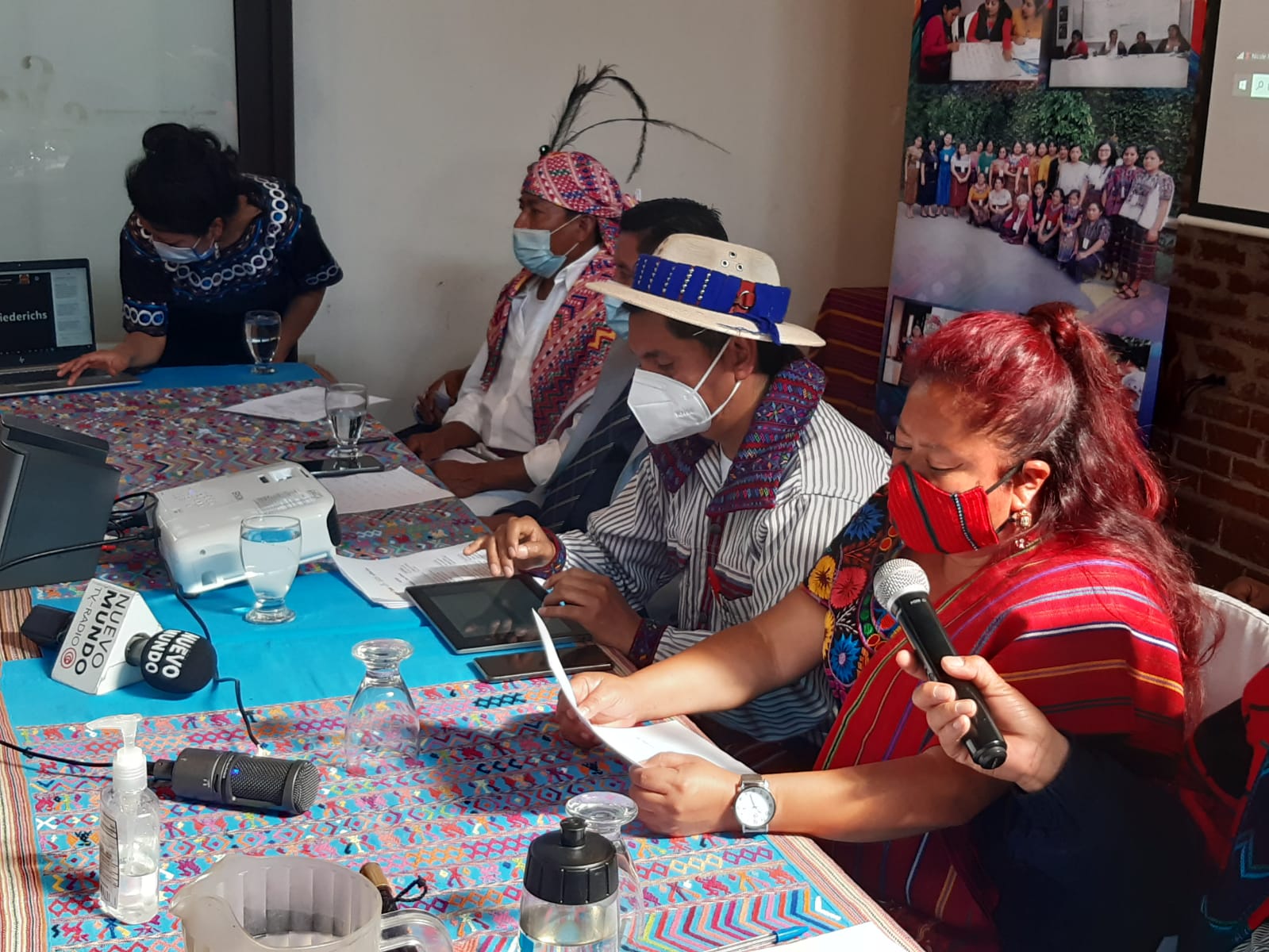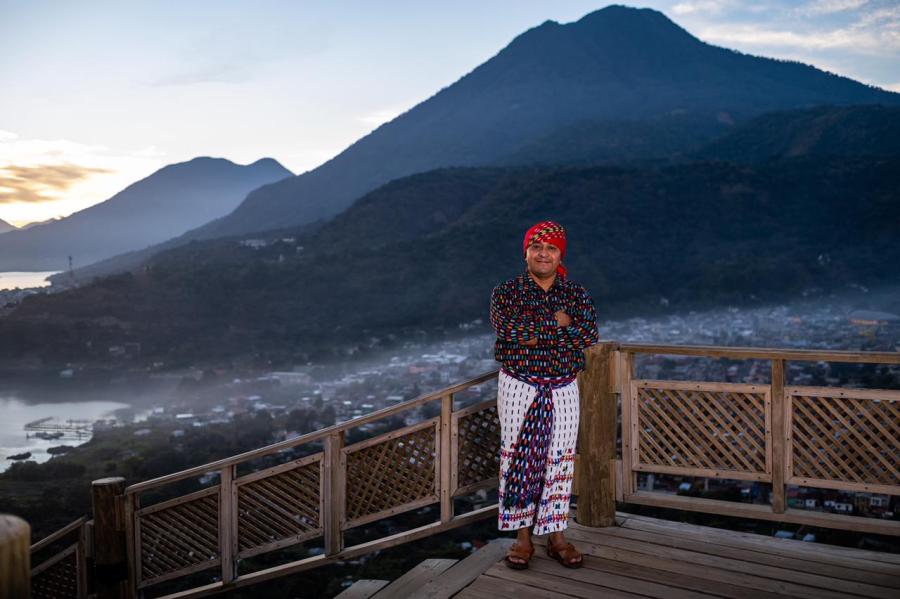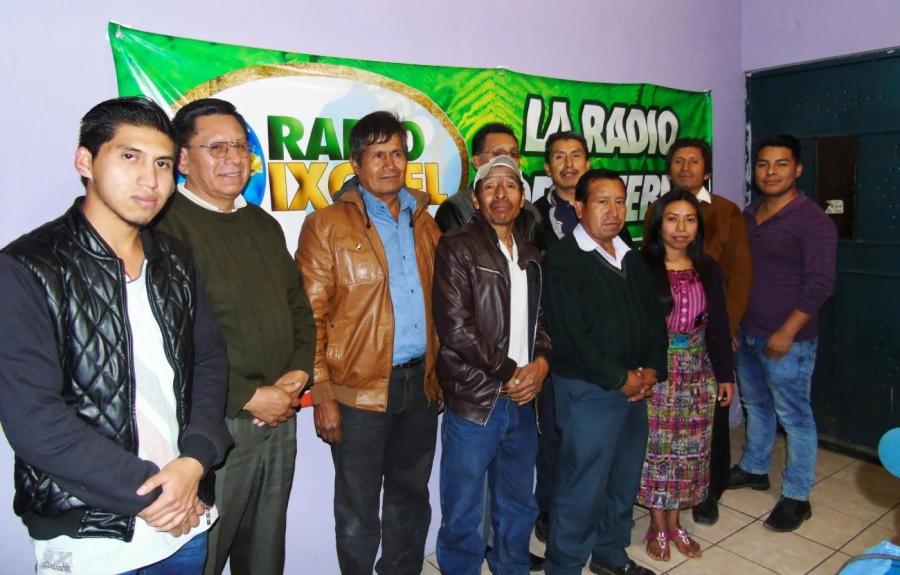By Rebecca Kirkpatrick (CS Intern)
On December 17, 2021, the Inter-American Court of Human Rights announced its decision in the case Indigenous Maya Kaqchikel Peoples of Sumpango vs. Guatemala. The Court ruled that the Republic of Guatemala was “internationally responsible for the violation of the rights to freedom of expression, equality before the law, and participation in cultural life” of Indigenous Peoples.
To help clarify the ruling and the ways that the State of Guatemala will be held accountable, US-based Cultural Survival and Guatemala-based Asociación Sobrevivencia Cultural, along with Suffolk University Human Rights and Indigenous Peoples Clinic and Asociación de Abogados Mayas, held a press conference on December 28, 2021. Representatives of the four named affected Indigenous communities, as well as the lawyers who represented them, were in attendance and spoke not only about the triumph of winning this case but also of the precedent that this case now sets for other governments and Indigenous communities throughout Latin America and the entire world. “This is also a victory for Indigenous Peoples throughout this hemisphere and beyond, in protecting their rights to freedom of expression and culture and promoting pluralism in media,” said Nicole Friedrichs, Lead Counsel on the case from the Human Rights and Indigenous Peoples Clinic at Suffolk University and a Cultural Survival Board Member.
The Inter-American Court specifically found the State of Guatemala responsible for “the violation of the rights to freedom of expression by denying, through the General Telecommunications Law, access to radio frequencies for Indigenous Peoples.” The Court ordered the State to “adopt the necessary measures to permit Maya Indigenous communities to freely operate their community radio stations, adapt the internal regulations to recognize community radio stations as differentiated means of communication, regulate a simple procedure for obtaining licenses, reserve part of the radioelectric spectrum for community radio stations, and immediately refrain from criminally prosecuting individuals who operate Indigenous community radio stations.” According to the official press release, “the Court affirmed the right of Indigenous Peoples to establish and use their own communication media, based on the content and the scope of the right of freedom of expression, but also taking into account the rights of Indigenous Peoples not to be discriminated against, their right to self-determination, and their cultural rights.”
There is no definitive timeframe for the State of Guatemala to comply with this ruling in general, however, there is a deadline for the government to comply with a few specific aspects of the ruling. For example, the Court’s decision must be published in full in the press in Guatemala within one year. In addition, the four affected Indigenous community radio stations must be recognized by the government and must be financially compensated within a year. Lastly, criminal prosecution of those who work at the community radio stations and government raids of the stations must be stopped immediately.
The official case was first brought to Guatemala’s Constitutional Court in October 2011, when Sobrevivencia Cultural submitted an action of unconstitutionality, stating that the State’s method for distribution of radio frequencies was economically and ethnically discriminatory. The case was originally filed on September 28, 2012, by Cultural Survival, Asociación Sobrevivencia Cultural and Suffolk University Law School’s Human Rights and Indigenous Peoples Clinic, and on April 3, 2020, after a lack of action from the Guatemalan government, the Inter-American Commission on Human Rights referred the case to the Inter-American Court of Human Rights. The hearing took place over the course of two days in June 2021, with representatives from Indigenous community radio stations speaking passionately about the importance of community radio for the transmission of Indigenous language and culture as well as vital information that affects the community. Indigenous rights experts also testified, discussing Indigenous communities’ right to freedom of expression and explaining the complicated process of obtaining radio frequencies via auction. Indigenous communities are historically and currently among the most economically marginalized in Guatemala despite making up 43-60 percent of the country’s population, so a process whereby radio frequencies are sold to the highest bidder makes it nearly impossible for Indigenous communities to access state-owned media.

When asked what the ruling meant to the communities after so many years of constant struggle, Anselmo Xunic Cabrera (Maya Kaqchikel), a member of Radio Ixchel, a community radio station in Sumpango Sacatepequez, Guatemala, replied, “We’ve been working for 18 years and suffered 18 years of persecution and defamation. They have called us pirate radios, illegal radio stations, they’ve called us subversive radio, and even terrorist radios. Now we’ve been proven right.” Amy Van Zyl-Chavarro, Co-Counsel from the Human Rights and Indigenous Peoples Clinic at Suffolk University, spoke about the implications that this ruling would have for issues such as climate change and increasing the number of frequencies for community radio stations in general. She said, “From the legal point of view, as far as human rights, the idea that Indigenous Peoples might have the right to operate their own means of communication is precisely to increase the number of voices that are in the media in general, which increases pluralism. I think this could change the conversation around topics such as climate change when there are communities whose voices have historically not been heard.”
Van Zyl-Chavarro went on to discuss the implications of a ruling like this for other Indigenous communities throughout Latin America: “This is the first time that an international tribunal has spoken out about the rights of Indigenous Peoples to create and use their own means of communication. This is a ruling that other Indigenous communities can use to advocate for their rights internally and try to get their governments to follow these recommendations from the Court.”
Decisions made by the Inter-American Court of Human Rights are binding, which means that the State of Guatemala must comply with the ruling and fulfill its obligations. This did not, however, stop questions from arising at the press conference regarding how to ensure that Guatemala does in fact comply with the recommendations of the ruling. To address these questions, Cristian Otzin, Director of the Asociación de Abogados Mayas, stated, “When it comes to criminalization, for example, we will have to look for mechanisms and the judicial figures to make sure that we can argue and support this ruling and look for those legal tools that can help us.” In addition to these tools, the Inter-American Court has its own process for ensuring its decision is upheld and respected by the Guatemalan government. The Court ordered Guatemala to submit a report within one year on the progress they’ve made in implementing the Court’s recommendations, and the community representatives and lawyers involved in the case also have the option to inform the Court of any progress, or lack thereof, along the way.
There has, as of yet, been no reaction to the ruling from the State of Guatemala. The atmosphere at the press conference, however, was nothing short of triumphant, celebratory, and inspiring. This is a momentous victory for Indigenous communities in Guatemala and around the world. Community radio stations keep local communities informed about important issues such as the global pandemic, but they also help to promote local language and culture and keep Indigenous traditions alive. Rosendo Pablo Ramirez (Maya Mam), director of Radio Xob’il Yol Qman Txun in Todos Santos Cuchumantán, Huehuetenango, Guatemala, made this clear in his testimony in court, stating, “We are promoting, spreading our music…it makes us happy. That is the importance [of community radio]...Talking about culture on the radio makes us remember and as a result, we can continue to exist in this world.” He reiterated this point at the press conference, saying, “Today, even, the percentage of Mayans has decreased, whether they've been killed, whether they’ve died, or they don’t have children; so we have to take this back. If within four years, the percentage of Mayans in the township has increased, then community radio is doing its job.”
With this ruling, the Inter-American Court of Human Rights has affirmed that freedom of expression constitutes a cornerstone of a democratic society, a fact that was eloquently addressed by Nicole Friedrichs during the hearing. While addressing the Court, Friedrichs argued, “As we have argued, without equal access to, and ownership of, media, including community radio, the full exercise of these rights to freedom of expression and culture by Indigenous Peoples is not possible. Without the ability to promote cultural and linguistic diversity, without their voice to counter a history of colonization and exclusion, the cornerstone is compromised. Without that first piece firmly in place, the structure of a vibrant and inclusive democratic society is unsteady and it buckles beneath the weight of inequality.”
Watch the full press conference (with English translation).
Inter-American Court on Human Rights Summary of the Case (In Spanish)
--
All photos courtesy of Asociación Sobrevivencia Cultural.


